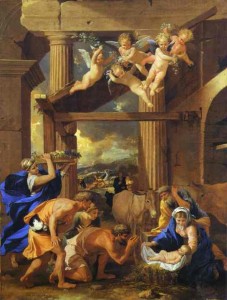Charpentier’s Christmas Dialogue
 Magnificat’s December program features what is perhaps the composer’s best-known work: the Messe de Minuit. The Mass will provide the basic structure of the program, which will also include the oratorio (or histoire sacreé) Dialogus inter angelos et pastores Judæ, which sets the Christmas Eve narrative of angels and shepherds.
Magnificat’s December program features what is perhaps the composer’s best-known work: the Messe de Minuit. The Mass will provide the basic structure of the program, which will also include the oratorio (or histoire sacreé) Dialogus inter angelos et pastores Judæ, which sets the Christmas Eve narrative of angels and shepherds.
Charpentier wrote at least six Christmas oratorios, which to some extent share both music and text. It has thus far proven impossible to determine the year or the circumstances for which the Dialogus inter angelos et pastores Judæ was composed. It closely resembles In nativitatem Domini Canticum, H. 416, sharing structure, text, and a considerable amount of music, though the keys and instrumentation differ.
The Dialogus opens with a grand prelude that lead’s to a sombre tenor recitative and a “Chorus of the Righteous” that describe state of anticipation, awaiting the birth of Christ. A bass air in the form of a rondeau follows. Between the elegant descending contours of two chorus another bass solo occurs in dialogue with the instruments, joyful and full of hope.
The second part opens with an instrumental depiction of night, enriched with “soft flutes” built on interwoven fugal textures. The composer effects a striking contrast by following the Night music with a “Shepherd’s Awakening,” followed by the appearance of the angel, addressing the shepherds in a blinding light. The Heavenly Host joins, singing to the glory of god and after a march of the shepherds, all fall adoringly before the newborn infant. The oratorio concludes with a chorus, in which the shepherd’s marvel at their experience.
Magnificat performed the Dialogus once before in December 2003 in a program that included the compser’s settings of the seven “O Antiphons.” These performances will feature sopranos Jennifer Ellis Kampani and Ruth Escher, haute-contre Christopher LeCluyse, tenor Daniel Hutchings and bass Robert Stafford.